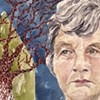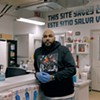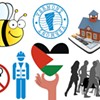Published November 10, 1999 at 1:00 a.m. | Updated December 9, 2015 at 11:44 a.m.
I don't know where I'm going
But I'm going to try for the kingdom if I can
'Cause it makes me feel like I'm a man
When I put a spike into my vein
then I tell you things aren't quite the same.
— From the song "Heroin," by Lou Reed
"I sold my body and my soul for drugs," Burlington addict Nina H. bravely confessed to a roomful of strangers — and a tape recorder — last month in Burlington at the third and final public hearing on methadone treatment in Vermont. The committee's findings will be presented to the legislature this winter as lawmakers consider whether to make the synthetic narcotic available to drug addicts in the state.
Nina, who has been using heroin for 20 years, is not your stereotypical junkie, if there is such a person. The 42-year-old Vermonter spoke with a quavering voice in vehement support of the drug she believes could allow her a "normal" life — and earned applause from many of the listeners. Her testimony at the hearing, along with that of other current and recovering addicts from around Vermont, was both emotional and logical.
“Why should I have to move out of my home state to get the drug that was made to treat my problem?" Nina asked. Although there were a few dissenting opinions, the majority spoke in favor of methadone treatment, which is controversial in Vermont in part because of Governor — and physician — Howard Dean's well-known opposition to it. Only eight states in the nation, including Vermont and neighboring New Hampshire, do not make the drug available to recovering addicts.
The testimony underscored the insidiousness of the drug every school kid is warned about, whose negative side effects include slowed gait, slurred speech, constricted pupils, droopy eyelids, impaired night vision, dry skin, itching, skin infections, vomiting, constipation, decreased sexual pleasure, respiratory depression, impaired immune system, decreased appetite, irregular heart beat and blood pressure, addiction, coma and death.
But heroin, also known as smack, horse, mud, brown sugar, black tar, Big H, dope and junk, makes a far more alluring first impression on those who try it. "You feel really beautiful," is how Nina describes a heroin high. "Any kind of self-doubt you ever had is gone. You just feel like you're really pretty and really good at whatever it is you want to be good at. Everything around you is really beautiful, like being wrapped in really beautiful gauze that you can see through.”
The first few years that Nina used, she says, she didn't feel omnipotent, just safe, happy and able to deal with life. If it was a delusion, she didn't care. "Nothing mattered nothing could hurt me. I didn't lose my sense of morality or values," she adds, "but my insecurities of what people thought or how I looked just didn't matter. I just wanted to go out and have fun and feel good, and for a long time it worked.”
From the kitchen table at her mother's house, Nina — her real name and other identifying details have been altered for this article to protect her privacy — gazes out the window at November clouds sulking over the Green Mountains as she talks about the addiction she's had most of her adult life. Nina refers to the infamous euphoric effects of the drug in the past tense because, for the last 10 years, it hasn't felt that way to her at all. Rather, Nina has taken heroin just to keep from getting sick — withdrawal symptoms are as horrific as the drug's side-effects — like the time she puked up a bucket full of bile in a jail cell. "It was so gross," she recalls with a grimace.
A lot of stories about addicts are written completely in the past tense because the addict has died, usually from an overdose. Though Nina is still alive, her story is only slightly less harrowing. She stopped shooting heroin — again — in August and requires daily doses of methadone to keep her stable.
This month Nina and her fiancé, Greg M., also a recovering addict, are moving to Greenfield, Mass., to be closer to the services of a methadone clinic. As the legislative testimony revealed, some Vermonters drive long distances every day to be treated there. After two decades of dope and desperation, Nina seems determined to shake her demon at last. While she once thought she would need to be on methadone the rest of her life, she now favors gradually reducing dependence on that drug — also highly addictive — and eventually going off it altogether. For one thing, the drug diminishes her enjoyment of sex, as did heroin. Still, in the past Nina has had as many relapses as detoxes — 16, by her count — and her "successes" have lasted only six months at best. Some former friends, tired of her broken promises, lost faith long ago in Nina's ability to break the habit. Why should this time be different?
Maybe because she now has two compelling reasons to come "clean": She's HIV-positive; and she's "finally got a boyfriend who doesn't want to see me with needles in my arms." But Nina knows, perhaps better than anyone, there are no guarantees.
Nina grew up in a picturesque, rural pocket of central Vermont, an only child and a straight-A student — except for algebra, she confesses. Her father, a restaurateur whom she remembers as very loving and nurturing, was 20 years older than his wife and died when Nina was 12. After that, her home life disintegrated: Her mother began seeing a man who molested Nina. She describes her mother, Susan, as "afraid of the guy; she didn't marry him, but she didn't make him leave. Of course, I felt guilty." Nina didn't tell her mother about the abuse until many years later — the first time she went to Maple Leaf Farm, a detox center in Underhill.
“The physical abuse stopped after about six months," Nina continues, "but the emotional ... I was afraid all the time. I grew up my whole teenage years terrified." When Susan took a nighttime job, Nina was left alone with her abuser — a man she says got her mother's cousin pregnant during the time he was living with them. Nina put a lock on her bedroom door. Whenever she went out on a date, "he accused me of fucking everyone in town," Nina remembers bitterly.
There is no doubt in her mind that childhood abuse led to low self-esteem, a feeling that she didn't deserve happiness or success. That same sense of worthlessness, Nina says, is why she dropped out of college, in upstate New York, after a year and a half — despite being bright, creative and interested in an acting career.
Nina also blames the abuse, and subsequent self-hatred, for her addiction. Had it "not happened to me, I think I would have been able to just try heroin and move on. But if you have this hole because your caretaker did not provide for you ... I just think that's a big piece of addiction.”
Nina's theory has been corroborated again and again. "I've been in a lot of clinics and met a lot of addicts, and every one of them has had some abuse in their past," she asserts. Statistics among women inmates at the Chittenden County Correctional Center support her arguments. The majority of incarcerated women have histories of substance abuse, according to superintendent John Murphy. "Roughly 70 percent," he adds, "have experienced some kind of sexual abuse.”
Nina's telling of the "junkie years" is convoluted and out of chronological order, a jumbled recall that perhaps reveals her state of mind for much of that time. It's difficult for her to sort out what happened and when — the effect of which is to dash her life into a kaleidoscope of blurry events. Nina's tale also reveals her enduring inclination toward a kind of innocence — she expresses hurt surprise about every friend or lover who lied to her or cheated on her — underscored by her characteristic demeanor of downcast eyes and soft voice. But sometimes, Nina admits, she was not above the same deceit; her desperate search for love included serial affairs with both women and men, each of them, including a young husband, offering only temporary solace — and usually drugs.
She was astonished when she was fired from a Burlington retail shop for showing up high on narcotics. It was a double standard, she protests, because her boss and other employees routinely snorted cocaine and drank on the premises. She says it wasn't fair. She never understood, until recently, why many of her "straight" friends turned away. She nearly whimpers at remembered injustices; even now, older and presumably wiser, Nina can't seem to quite relinquish the familiar role of victim. "I believe I suffer from post-traumatic stress syndrome," she offers.
Like many teenagers, Nina had tried pot in high school, though she later rejected it — "it made me paranoid," she says. "I didn't like it." She found her body had little tolerance for alcohol, either, and she never smoked cigarettes. She liked cocaine, and the downers Quaaludes and Dilaudids. For quite a while, she "could hang onto a quarter-gram of coke for weeks," Nina notes, using it only as a "treat." But the first time she injected cocaine, "things really changed — you want that rush over and over again. The first time, you hear bells ringing, you feel like you're floating, it's better than coming." The rush lasted three or four seconds; she began to buy a lot more coke. "Drugs started to turn into a sort of psychological need," she recalls.
Still, Nina insists she was no addicted to cocaine and never abused legitimate prescription drugs — except for the three times she tried to commit suicide by ingesting pills. But after she began using heroin in 1980, it quickly became the biggest monkey on her back. By 1981, she had contracted hepatitis by sharing needles with a friend. She began to receive disability payments for depression and addiction. "The federal laws changed in 1996 and you could no longer receive for addiction," Nina explains, "so I had to be reevaluated. But by then I was HIV-positive." She receives disability still — a total of $571 a month. She hasn't had a full-time job for close to a decade.
Over the years, Nina has been in and out of clinics — she was treated at UVM s Substance Abuse Research Center seven times; she went to the Brattleboro Retreat five times and Maple Leaf once, among other clinics in Massachusetts. Even though she wasn't an alcoholic, at the urging of a friend she tried Alcoholics Anonymous for support. In 1985 she had sworn off drugs and thrown her coke stash away on New Year's Eve — an action she was "very proud of." But one day when she mentioned to her AA sponsor that she occasionally smoked a little pot, the sponsor told her she couldn't do that. The woman also disapproved of Nina's job at the time in a Burlington bar. Nina derides the belief that if you are addicted to one substance you are at risk with them all.
“In the group I said, 'I came here to stop shooting heroin and cocaine. If I meet Don Juan in the desert and he offers me peyote, I'm going to take it,"' Nina says. Though the group was supportive, she became disenchanted with the 12-step philosophy and eventually left it. Off and on through the years, though, she has seen a private therapist.
It was not long after the AA experience that Nina had another relapse. Why? She had a job, she was collaborating on an art project and getting paid for it, she was in a play. "Things were going too good," she says. "This is typical for relapsers — things are going too good and you don't believe they should, because of the things that happened to you as a kid. I'm obviously not worth anything. It's only in hindsight," she adds, "that I realize that.”
Her roommate at the time, a recovering coke-head, kicked Nina out of the house.
When Nina moved to Boston in 1994, her self-destruction reached a new low: She started turning tricks to pay for drugs. She says — apparently unaware of the irony — that she was really lucky nothing "bad" ever happened to her. "I could possibly have gotten killed, gotten in a car with the wrong person," she suggests.
But prostitution itself, of course, was bad enough. "I hated myself, I hated men, my relationship. How could someone who loves you let you do that?" She's referring to her then-boyfriend, who took her to Park Square where she would hook until there was enough drug money for both of them.
Her voice rising, she momentarily gets a little defensive: "A part of me feels like, okay, isn't working at McDonald's prostituting myself, because I'm really smart? I struggle with this whole political issue. Guys would ask me, when I was a prostitute, 'What are you doing here? You don't belong here.' I would ask them, What are you doing here?’”
No matter how she frames it, though, Nina acknowledges those were rough times. In one of many moves, she lost all her poetry and other writing — a casualty she feels erased a part of her identity. Far more devastating, her boyfriend died from complications due to AIDS, and because of unprotected sex with him, she learned she was HIV-positive a year later. For a while, she lived with a 60- year-old crack addict. She wanted to go to poetry readings but didn't have the energy. Her days, as she attempts to describe them, sound aimless and depressing, though she says, "I read a lot.”
Sometime in this period, Nina was rejected from a clinic program for missing three consecutive days — "I was just too tired to go," she insists — and she started to get really, really sick. She called an ambulance, which took her to a detox center in Jamaica Plain. "When I threw up all over their bathroom," Nina remembers, "they broke protocol and got me some methadone real quick.”
At that center Nina met Don — a "friendly guy" who turned out to be a thief, a dealer and her next boyfriend. Nina remembers vividly a time she and Don were arrested for possession. She was humiliated by the hose-down in what she calls "a really scary jail" out of state. The couple moved to Vermont. Soon, Don was running dope from Boston — then, as now, bags of heroin bought for $10 in the city sold for $35 in Burlington, a profitable deal. "Don was always doing some shit, I don't know what," Nina says. She didn't want to know.
That boyfriend ended up in prison — he's now serving time on a federal charge of possession. Nina marvels that she escaped being indicted and imprisoned herself. The federal agents were "always nice to me," she says. Maybe that seeming "innocence" is what saved her.
Nina broke up with Don after he went to jail. Within months, she hooked up with Greg, and by all appearances so far, that has been a good thing. Injured several years ago in an accident, he too is on disability and isn't sure of his future beyond moving to Greenfield. But while he seems devoted to Nina and determined to keep them both off drugs, Greg is playing with a different kind of fire: He refuses to use a condom. Nina is embarrassed to admit this; they both know the risks. "But there's nothing I can do about it," she laments. "It's his choice.”
In the last year or so Nina has been a peer educator for Vermonters with AIDS or HIV. It's a volunteer position — and a mission — that she takes very seriously. "She's really doing great," says her friend and fellow addict Michael M. "She's really become an advocate." Nina's job, along with counseling any "new HIVs" who want it, is to disseminate information about safe sex, high-risk behaviors and free AIDS testing, and to give out condoms and bleach kits — bleach kills the virus on syringes and spoons.
Even when she was using, Nina would talk to other addicts about how to avoid HIV. "I would offer to go with people to the anonymous testing sites," she says. "Of course, everyone said they were practicing safe sex. I knew some of them were lying." After two decades in the duplicitous world of dope addiction, she has developed a healthy cynicism that suggests she may not be taken in so easily next time.
"I can only hope and pray," says Nina's mother Susan, "that this time it will be different." She's referring to Nina and Greg's move to Greenfield and the methadone treatment. "It's really hard to believe it's going to be, but I have a good feeling about this, and her relationship now. I have not heard her say for months that she doesn't want to live.”
Oddly, Susan does not recollect the suicide attempt nearly 10 years ago that Nina said took place at her mother's house while her mother was there. Nina says she took 30 tablets of the anti-depressant amitriptylin, wrote suicide notes, told her mother she was killing herself, and proceeded to sleep for three days. She believes her mother looked in on her but did not call an ambulance "because she was afraid they would take me to Waterbury.”
“She used to talk about committing suicide a lot," counters Susan, perplexed because she can't remember that particular incident. "She may have made the remark, but she'd made it so many times before I probably didn't pay any attention to it." Susan acknowledges that for many years her daughter didn't want to live but, she says, "I guess she's a survivor.”
Susan endured plenty of sorrow as her only child fell victim to drugs, but exhibits a classic Vermont stoicism about it now. Though kindly and plainspoken, she seems slightly numb, as if she wishes she could look the other way but has seen far too much to even try. Twenty years ago, though, Susan didn't have a clue. "Never having been around anyone ... that was using drugs," she says, "I guess I was pretty much in the dark about it all.”
Susan agrees it's been difficult to cope, but says she can "get it off my chest" with a couple of her sisters and her best friend. "It's really been hard because there isn't anyone else in the family that ever did any drugs ... They seem to think you can just quit if you want to." She says the hardest thing was watching Nina not finish school, and watching her health go downhill. "She never used to take care of herself, she'd go without food so she could get drugs.”
One thing Susan credits Nina with, though, is always staying close. "For a long time she carried a lot of anger towards me because of stuff that happened to her in her teenage years, but she wouldn't go all that long without getting in touch.”
Indeed, Susan was always the one whose home — and often money — was available, and Nina has retreated to it nearly as often as she has tried to get clean. "She doesn't like it," Nina says of her lifestyle, "but if it wasn't for her I'd be dead. I don't believe in the enabling concept; I believe she saved my life.”
Asked why she put up with Nina — and a string of often unsavory companions — Susan says simply, "because I just love her so much. People told me to try 'tough love,' and I tried it for a couple months and just couldn't stand it. If anything had happened to her and I had disowned her," Susan continues, "I wouldn't have been able to live with myself. I've talked with a few different people whose children are addicts and they don't know where their kids are! How can any parent stand it? Even if they're 45 years old, they're still your child.”
Susan doesn't know what she might have done differently to help Nina, but she says she did once consider moving to a state that had a methadone clinic. Though she's too reticent to advocate publicly, she feels strongly that Vermont should make the treatment available to its growing population of addicts. And her advice to parents of young users is simply "try to get them some help, whatever that help is. Of course," she adds, "unless people have been through it, they don't really understand it. More information needs to get out. I think it's pathetic it's taken [the state] this long to realize there is a drug problem in Vermont.”
Like her mother, Nina hopes that her story will be a cautionary tale to potential users, or those who have flirted with heroin but are not yet hooked. She knows that she glamourized drugs herself in the beginning, and believes that young users in, for instance, Burlington's City Hall Park think it's "cool" to be a dealer. "There's nothing cool about it," she declares flatly. “There’s nothing cool about jail.”
She points to the example of her friend Lynn, who, even exposed to the grim realities of Nina's life, succumbed to addiction herself. "Lynn is from a very wealthy family in Boston. She saw me in Burlington be a heroin addict, she saw what it was like. She saw [my friend] Robert and me go through hell when we needed drugs, the people we had to hang out with. She had a cocaine-snorting problem ... I tried everything in my power to keep her from becoming an addict.”
But after Nina returned from a stint in Boston, Lynn was shooting up. "I guess I finally knew what a lot of my friends had felt about me," Nina says. "I couldn't understand how she let herself fall into that when she knew what it was like.”
Nina understands it now: Lynn loved the "beautiful high," as she had at first, before the terrible fall.
As a peer educator, Nina says, "I try to share my experience about romanticizing drugs for a long time. You know, the suffering, tortured artist. That's just bullshit. When you're in the back seat of a car with a redneck and you're forced to have sex with him for drugs, there's nothing romantic about that.”
But if she's clearer-eyed about heroin now, Nina is also convinced that no amount of proselytizing, lecturing or even modeling can force a junkie to quit. "Nobody will stop until they're ready," she says. "You can't push that decision on them until they've lost.”
Twenty years of Nina's life were all but lost, and methadone will not bring them back. But she's ready to stake her future on it. To the critics who believe methadone treatment is simply trading one addiction for another, Nina has a ready answer. "I think it's a lot better to go drink some juice that may be addicting than to have to go to the most dangerous parts of the city to cop drugs, to live a dangerous, illegal lifestyle.
“I just want to emphasize that I wouldn't be able to get anything done if I didn't have methadone — I wouldn't be helping people, I wouldn't have a savings account, I wouldn't be making car payments," Nina adds. "I want to go back to college; once my life is stable, I can do that. I would like to work with other addicts and people with HIV ... If I could get methadone in Vermont I would think about staying here.
“I’m looking for new ways to fill that empty hole," Nina concludes. “I’m trying to heal it.”
More By This Author
Comments
Comments are closed.
From 2014-2020, Seven Days allowed readers to comment on all stories posted on our website. While we've appreciated the suggestions and insights, right now Seven Days is prioritizing our core mission — producing high-quality, responsible local journalism — over moderating online debates between readers.
To criticize, correct or praise our reporting, please send us a letter to the editor or send us a tip. We’ll check it out and report the results.
Online comments may return when we have better tech tools for managing them. Thanks for reading.














































